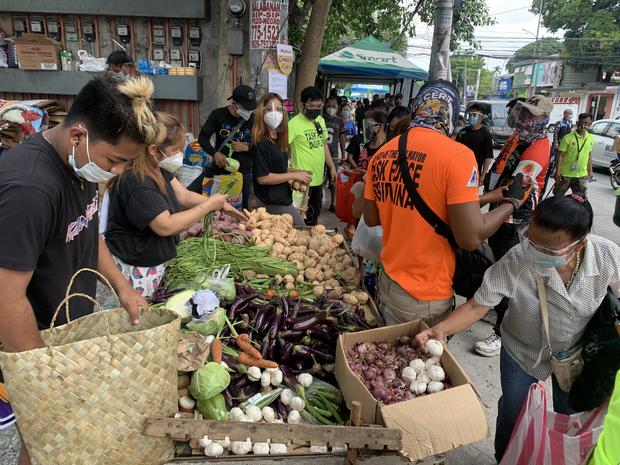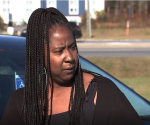COVID food pantry operators draw accusations of communism in the Philippines
[ad_1]
Manila, Philippines — Julie Ann de Leon is homeless and jobless. At 52, she also has four children to feed. She used to make up to $15 per day helping drivers of jeepneys, the Philippines’ version of mini-bus taxis, find passengers in Manila. But coronavirus lockdowns have upended the public transport sector, and De Leon is lucky now to bring home 75 cents in a day.
CBS/Barnaby Lo
When she learned that food aid was being distributed by private citizens to help other members of the community get through the pandemic downturn, she wasted no time. On Friday she walked three miles to get to the community pantry in the Maginhawa neighborhood of Quezon City, a suburb of the capital, where she spent four hours in line.
“I’d be thankful for whatever is given. If it’s food that’s enough only for a day, that’s still a huge help for us,” she told CBS News.
The community pantry idea started in Maginhawa, with a single wooden cart of fresh food and essential goods being left out in the middle of April. But with so many in need, the idea quickly caught on and spread like wildfire across the Philippines. Just a couple weeks later, there are around 400 “pantries” operating around the country.
CBS/Barnaby Lo
The idea is to donate only what you can and take only what you need, according to Ana Patricia Non, the young woman who set up the Maginhawa Community Pantry.
“I thought this might just be a small step, but we need to take action, because government aid has not been enough,” Non said on Saturday in an interview with Manila-based online media platform, “Now You Know.”
The Philippines now has to the fastest-growing COVID-19 outbreak in Southeast Asia. On Monday, the country’s health department reported 8,929 new cases, bringing the total to over 1 million. There were 70 more deaths blamed on the disease on Monday.
The virus has forced the government to impose protracted lockdowns, which have pushed the economy to fall into its worst recession since World War II. More than 4 million Filipinos were unemployed in February, according to government data.
CBS/Barnaby Lo
“We have a small neighborhood store but people are jobless, so our sales have also suffered. We never needed help like this,” said Manila resident Maria Luisa Baradicho.
Community activism, or communism?
Despite the apparent spirit of goodwill behind the pantries, however, some government officials have cast doubts over the intentions of organizers.
“Why are these community pantries sprouting all over all of a sudden? Why do they have a single theme?” Lt. Gen. Antonio Parlade, spokesperson of the government’s anti-communist task force, said in an interview with local cable news network, One News.
He then compared Ana Patricia Non to Satan.
“Patricia is one person, right? Same with Satan. Satan gave Eve an apple. That’s how it all started.”
Non closed her shop for a day out of fear for her own safety and the safety of the volunteers who work with her.
“Police officers repeatedly asked for my contact number. I also learned that they kept asking for my address from my volunteers,” she told CBS News.
The clincher was a post on Facebook by a local police office, accusing Patricia and other community pantry proponents of being fronts for the armed faction of the Communist Party of the Philippines.
The practice of labeling people communists, known in the Philippines as “red-tagging,” has increased under hardline President Rodrigo Duterte. Blamed for the killing of several activists, the movement has clear parallels with the Cold War-era “Red Scare” in the U.S. and the anti-communist crusading of Sen. Joseph McCarthy.
The mayor of Quezon City, where Non’s community pantry is located, quickly stepped in. The Facebook post was taken down and the office of the city’s police chief issued an apology.
Parlade and another spokesperson for the government’s anti-communist task force, Lorraine Badoy, have been barred from publicly commenting on the community pantries.
“Kindness is everyone’s color. Whatever your beliefs are, as long as you are helping wholeheartedly, you can be assured of our support,” Delfin Lorezana, the country’s national defense secretary, said in a statement.
Teddy Casiño, a former left-leaning lawmaker and a community pantry organizer himself, said he didn’t expect the red-tagging.
“I was taken aback, because it’s so clear that there’s nothing sinister about this thing. What’s sad is that those who were harassed had to stop, and those who may have been thinking about putting up pantries, didn’t anymore.”
Now You Know
At the end of the day, Non said the community pantries aren’t meant to be a permanent solution.
“Eventually donations will die down. Donors will get tired. And that’s okay; Community pantries are not meant to solve poverty and hunger; it’s just meant to get us through one day at a time.”
CBS News’ Barnaby Lo in Manila hosts the current affairs program “Viewpoint” on the “Now You Know” online civic media platform.
[ad_2]
Source link














